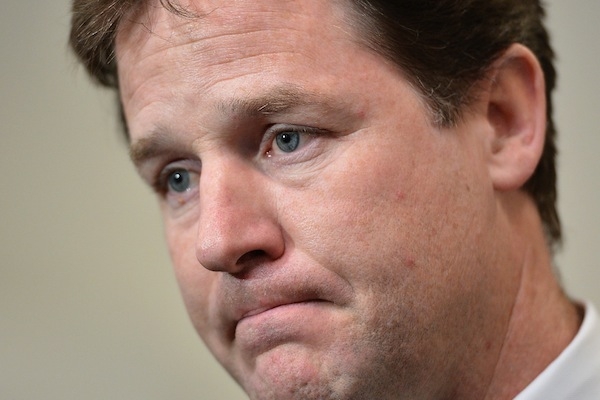There’s nothing wrong with Nick Clegg putting some distance between his party and the Conservatives. Today the Liberal Democrat leader is going to open up about the gory details of government, explaining where his party has held the Tories back, and heralding a new era where he and colleagues are honest about what they actually think of policies. On Friday, I argued that this sort of honesty about the workings of coalition government was a good thing. But there is one caveat to this.
Conservative MPs are pretty unhappy at present, and it’s not just that they are overtired before the Christmas break. Their unhappiness stems partly from the splits crisscrossing their party, but also from a disconnect with the Tory leadership and a yearning for certain policies which coalition seems to be blocking. Nick Clegg may have his own Tumblr dedicated to him looking sad, but that doesn’t mean he’s the only leader who should worry about the effects of coalition on those who sit on the backbenches, or those grassroots members who, rather than carrying a ministerial red box, are still carrying campaign leaflets and shoving them through letterboxes.
If Clegg thinks setting out separate positions from the Conservatives is helpful to his party, the Tories can’t just watch him set up a new phase of the Coalition himself. Being honest about the differences between the two parties is a mature way of conducting two-party government, but the Conservatives need to be honest about gory government as well as the Lib Dems.
It’s not just that Cameron would gain electorally from being clear that he would like to go further than the Lib Dems on welfare, immigration and European policy. But he would also make gains with his own MPs, some of whom are suspicious that he quite likes Coalition because it means he can ignore the likes of Peter Bone. If the two parties are going to set out their store ahead of policies making their way into legislation, then both should gain, not just the Lib Dems. The Prime Minister made a speech in the summer calling for benefit cuts to under-25s which were then blocked by the Lib Dems: his Europe speech needs to set out a Conservative rather than Coalition position, too.
The problem of doing too much differentiation is that voters might start to think that the government isn’t achieving anything because the two parties are disagreeing. But Clegg’s former adviser Richard Reeves says the need for this separation strategy is so great that if it fails, ‘the curtain will probably fall on the coalition before 2015’. Oddly enough, I heard that a Conservative whip had been saying something similar recently: apparently one MP with a chance of a ministerial post was told to behave themselves and not stick their head above the parapet too much and then when things fell apart in 2014, there would be government jobs for those who deserved them. Now this sounds more like a whip saying anything to keep a naughty brood in check, but if we’re going to hear more about the gory details of government, perhaps we’ll start to learn what the exit strategy might look like for the Coalition, too.







Comments